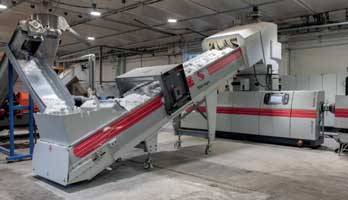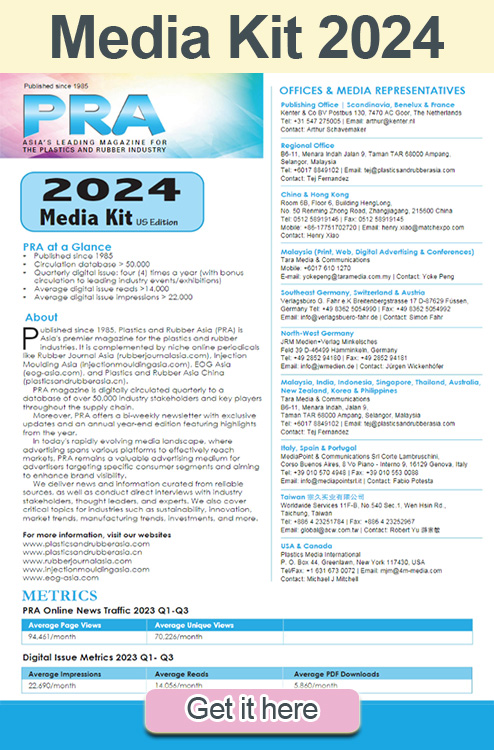Recycling: Coke launches 100% rPET bottles in Hong Kong/Indonesia

Coca-Cola recently debuted its 500 ml brands in 100% rPET (recycled plastic) bottles, said to be the first-ever Coca-Cola packaging made from 100% rPET in Hong Kong.
The new packaging features “I’m a 100% rPET bottle” and “Recycle Me Again” messages to build recycling awareness and encourage action among consumers.
In partnership with industry associations and other organisations, including Drink Without Waste and industry peers, the Coca-Cola system in Hong Kong is investing HK$3 million in 2024 to support a new neighbourhood collection scheme by mobilising participating housing estates, their cleaners and the resident households to build a recycling habit and mechanism. Each resident in Hong Kong is invited to separate and recycle plastic bottles to help build a plastic bottle “recycling loop”!
Hunter Jin, CEO, Swire Coca-Cola SEAHKT Operations (Southeast Asia, Hong Kong SAR and Taiwan markets), also highlighted a significant investment the firm has been making in New Life Plastics, Hong Kong’s first foodgrade-ready plastic recycling facility. “It will have sufficient capacity to recycle each PET bottle we sell by 2030 as part of our World Without Waste ambitions.”
This rollout further enhances the company’s commitment to a sustainable future in Hong Kong. The rPET journey commenced in 2019, when a variety of Coca-Cola brands started using rPET content in the production of bottles. Also since 2020, all locally produced bonaqua water bottles (2 l or below) use 100% rPET. Bonaqua sparkling water launched in recent months has also adopted this sustainable format.
Each Bonaqua 500 ml bottle weighs 11.8-52.8% lighter than a typical PET bottle in the market - helping to achieve 29% less overall CO2 emissions compared with other water brands, says Coke.
In 2020, Sprite made a bold transition to transparent bottles to enhance bottle recyclability. The effort continues with the recent adoption of transparent bottles by Schweppes sparkling water. Furthermore, to help reduce plastic use, Bonaqua has been placing nearly 170 Water Stations across the city and advocating “bring your own bottle”.
In 2021, Bonaqua launched its first label-less bottled water, further reducing packaging waste and improving recyclability through packaging design.
And in 2022, Coca-Cola Hong Kong reintroduced the Returnable Glass Bottles line encompassing key brands such as CocaCola, Coca-Cola No Sugar, Sprite, Fanta and Schweppes. Bonaqua followed with the launch of its first label-less bottled water for individual sale, making it available to a broader range of customers and last year, rolled out water in Returnable Glass Bottles, inviting like-minded hotel industry players to join the sustainability effort.

Meanwhile in Indonesia, recycler PT Amandina Bumi Nusantara has produced the rPET for Coca-Cola, Fanta, Sprite and Sprite Waterlymon bottles on two recoSTAR PET 165 HC iV+ bottle-to-bottle recycling systems from Starlinger.
In partnership with industry associations and other organisations, including Drink Without Waste and industry peers, the Coca-Cola system in Hong Kong is investing HK$3 million in 2024 to support a new neighbourhood collection scheme by mobilising participating housing estates, their cleaners and the resident households to build a recycling habit and mechanism. Each resident in Hong Kong is invited to separate and recycle plastic bottles to help build a plastic bottle “recycling loop”!
Hunter Jin, CEO, Swire Coca-Cola SEAHKT Operations (Southeast Asia, Hong Kong SAR and Taiwan markets), also highlighted a significant investment the firm has been making in New Life Plastics, Hong Kong’s first foodgrade-ready plastic recycling facility. “It will have sufficient capacity to recycle each PET bottle we sell by 2030 as part of our World Without Waste ambitions.”
This rollout further enhances the company’s commitment to a sustainable future in Hong Kong. The rPET journey commenced in 2019, when a variety of Coca-Cola brands started using rPET content in the production of bottles. Also since 2020, all locally produced bonaqua water bottles (2 l or below) use 100% rPET. Bonaqua sparkling water launched in recent months has also adopted this sustainable format.
Each Bonaqua 500 ml bottle weighs 11.8-52.8% lighter than a typical PET bottle in the market - helping to achieve 29% less overall CO2 emissions compared with other water brands, says Coke.
In 2020, Sprite made a bold transition to transparent bottles to enhance bottle recyclability. The effort continues with the recent adoption of transparent bottles by Schweppes sparkling water. Furthermore, to help reduce plastic use, Bonaqua has been placing nearly 170 Water Stations across the city and advocating “bring your own bottle”.
In 2021, Bonaqua launched its first label-less bottled water, further reducing packaging waste and improving recyclability through packaging design.
And in 2022, Coca-Cola Hong Kong reintroduced the Returnable Glass Bottles line encompassing key brands such as CocaCola, Coca-Cola No Sugar, Sprite, Fanta and Schweppes. Bonaqua followed with the launch of its first label-less bottled water for individual sale, making it available to a broader range of customers and last year, rolled out water in Returnable Glass Bottles, inviting like-minded hotel industry players to join the sustainability effort.
fort. Meanwhile in Indonesia, recycler PT Amandina Bumi Nusantara has produced the rPET for Coca-Cola, Fanta, Sprite and Sprite Waterlymon bottles on two recoSTAR PET 165 HC iV+ bottle-to-bottle recycling systems from Starlinger.
In June 2023, Coca-Cola Indonesia, in partnership with Coca-Cola Europacific Partners Indonesia (CCEP Indonesia), launched the first bottles made from 100% rPET (excluding bottle caps and labels) for its most popular soft drink brands
The rPET is supplied by one of Indonesia’s recycling pioneers, Amandina Bumi Nusantara. The company operates a plastics recycling plant on the outskirts of Jakarta with two Starlinger recoSTAR PET HC iV+ bottleto-bottle recycling systems and processes 3,000 tonnes of collected PET bottles every month. Two types of clear bottle-grade rPET pellets are produced - one for carbonated beverages and one for spring water. In addition, the company supplies hot-washed flakes in clear and lightblue colours.
Amandina Bumi Nusantara collaborates with Mahija Parahita Nusantara Foundation, a non-profit organisation founded by CCEP Indonesia and Dynapack Asia. As in many other Asian countries, over 90% of plastic waste collection activities in Indonesia are carried out by waste pickers in the informal sector - called “recycling heroes” by Amandina and Mahija. The remaining percentage is managed through formalised systems such as waste banks and other organised collection efforts.
CCEP Indonesia aims to make 100% of its packaging recyclable and to ensure that at least 50% of the plastic bottles are made of rPET by 2025. The company’s targets for 2030 are to collect 100% of their plastic bottles to enter the recycling stream, and to eliminate virgin plastic in their plastic bottles
Amandina Bumi Nusantara, which was established by CCEP Indonesia, one of the largest soft drink producers in Indonesia, and Dynapack Asia, one of Asia’s leading plastic packaging companies, as a facility for PET bottle- to-bottle recycling in 2021, is also the first PET recycling company that has obtained the SNI Marking Product Certificate (SPPT) from the National Standardisation Agency (BSN) for implementing the Indonesian National Standard (SNI) 8424:2017.
(IMA)Subscribe to Get the Latest Updates from IMA Please click here
©2024 Injection Moulding Asia. All rights reserved.















